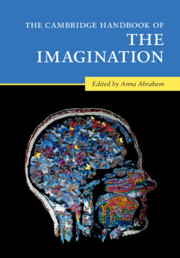Book contents
- The Cambridge Handbook of the Imagination
- The Cambridge Handbook of the Imagination
- Copyright page
- Dedication
- Contents
- Figures
- Contributors
- Acknowledgments
- 1 Surveying the Imagination Landscape
- Part I Theoretical Perspectives on the Imagination
- Part II Imagery-Based Forms of the Imagination
- Part III Intentionality-Based Forms of the Imagination
- 19 Continuities and Discontinuities Between Imagination and Memory: The View from Philosophy
- 20 Imagining and Experiencing the Self on Cognitive Maps
- 21 The Neuroscience of Imaginative Thought: An Integrative Framework
- 22 Imagination and Self-Referential Thinking
- 23 Imaginary Friends: How Imaginary Minds Mimic Real Life
- 24 Imagination and Moral Cognition
- 25 Moral Reasoning: A Network Neuroscience Perspective
- 26 The Future-Directed Functions of the Imagination: From Prediction to Metaforesight
- Part IV Novel Combinatorial Forms of the Imagination
- Part V Phenomenology-Based Forms of the Imagination
- Part VI Altered States of the Imagination
- Name Index
- Subject Index
- References
25 - Moral Reasoning: A Network Neuroscience Perspective
from Part III - Intentionality-Based Forms of the Imagination
Published online by Cambridge University Press: 26 May 2020
- The Cambridge Handbook of the Imagination
- The Cambridge Handbook of the Imagination
- Copyright page
- Dedication
- Contents
- Figures
- Contributors
- Acknowledgments
- 1 Surveying the Imagination Landscape
- Part I Theoretical Perspectives on the Imagination
- Part II Imagery-Based Forms of the Imagination
- Part III Intentionality-Based Forms of the Imagination
- 19 Continuities and Discontinuities Between Imagination and Memory: The View from Philosophy
- 20 Imagining and Experiencing the Self on Cognitive Maps
- 21 The Neuroscience of Imaginative Thought: An Integrative Framework
- 22 Imagination and Self-Referential Thinking
- 23 Imaginary Friends: How Imaginary Minds Mimic Real Life
- 24 Imagination and Moral Cognition
- 25 Moral Reasoning: A Network Neuroscience Perspective
- 26 The Future-Directed Functions of the Imagination: From Prediction to Metaforesight
- Part IV Novel Combinatorial Forms of the Imagination
- Part V Phenomenology-Based Forms of the Imagination
- Part VI Altered States of the Imagination
- Name Index
- Subject Index
- References
Summary
Through imagining possible actions and considering their consequences, we are able to reason about the morality of behavior – judging whether an action is morally right or wrong. Neuroscience research indicates that moral reasoning depends on a complex, broadly distributed network of brain regions that interact in a both cooperative and competitive manner. Understanding the underlying neurobiology that governs how these regions dynamically interact to produce patterns of behavior is therefore of interest to the field. Currently, prominent theories suggest that moral judgments (consequentialist or deontological) are the product of two distinct cognitive systems (i.e. a dual-process framework). Network neuroscience, an emerging field that measures and interprets brain activity through the framework of modern network science, is positioned to expand our understanding of this dual-process framework by examining how topological properties of networks influence consequentialist and deontological reasoning, and how these two processing systems interact in order to imagine hypothetical scenarios during complex deontological reasoning tasks. In this chapter, we review evidence from neuroscience that bears on our understanding of the dual-process moral reasoning framework and advance a network neuroscience perspective on the neurobiological substrates that underlie it.
- Type
- Chapter
- Information
- The Cambridge Handbook of the Imagination , pp. 406 - 424Publisher: Cambridge University PressPrint publication year: 2020

